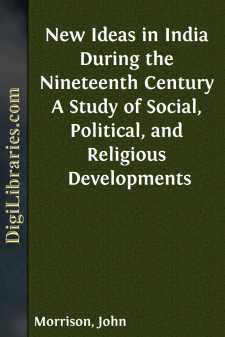Categories
- Antiques & Collectibles 13
- Architecture 36
- Art 48
- Bibles 22
- Biography & Autobiography 813
- Body, Mind & Spirit 142
- Business & Economics 28
- Children's Books 17
- Children's Fiction 14
- Computers 4
- Cooking 94
- Crafts & Hobbies 4
- Drama 346
- Education 46
- Family & Relationships 57
- Fiction 11829
- Games 19
- Gardening 17
- Health & Fitness 34
- History 1377
- House & Home 1
- Humor 147
- Juvenile Fiction 1873
- Juvenile Nonfiction 202
- Language Arts & Disciplines 88
- Law 16
- Literary Collections 686
- Literary Criticism 179
- Mathematics 13
- Medical 41
- Music 40
- Nature 179
- Non-Classifiable 1768
- Performing Arts 7
- Periodicals 1453
- Philosophy 64
- Photography 2
- Poetry 896
- Political Science 203
- Psychology 42
- Reference 154
- Religion 513
- Science 126
- Self-Help 84
- Social Science 81
- Sports & Recreation 34
- Study Aids 3
- Technology & Engineering 59
- Transportation 23
- Travel 463
- True Crime 29
New Ideas in India During the Nineteenth Century A Study of Social, Political, and Religious Developments
by: John Morrison
Categories:
Description:
Excerpt
CHAPTER I
THE NEW ERA—SOME LEADING WITNESSES
"The epoch ends, the world is still,The age has talked and worked its fill;
The famous men of war have fought,
The famous speculators thought.
See on the cumbered plain,
Clearing a stage,
Scattering the past about,
Comes the New Age.
Bards make new poems;
Thinkers, new schools;
Statesmen, new systems;
Critics, new rules."
MATTHEW ARNOLD.
India is a land of manifold interest. For the visitors who crowd thither every cold season, and for the still larger number who will never see India, but have felt the glamour of the ancient land whose destiny is now so strangely linked to that of our far-off and latter-day islands, India has not one but many interests. There is the interest of the architectural glories of the Moghul emperors, in whose grand halls of audience, now deserted and merely places of show, a solitary British soldier stands sentry over a visitors' book. For the great capitals of India have moved from Delhi and Agra, the old strategic points in the centre of the great northern plain, to Calcutta, Bombay, Madras, and Rangoon, new cities on the sea, to suit the later over-sea rulers of India. There is the interest of the grand organisation of the British Government, holding in its strong paternal grasp that vast continent of three hundred million souls. Sometimes the sight of the letters V.R.I, or E.R.I. (Edwardus Rex Imperator) makes one think of the imperial S.P.Q.R. once not unfamiliar in Britain. But this interest rather I would emphasise—the penetration into the remotest jungle of the great organisation of the British Government is a wonderful thing. By the coinage, the post-office, the railways, the administration of justice, the encouragement of education, the relief of famine,—by such ways the great organisation has penetrated everywhere,—in spite of faults, the greatest blessing that has come to India in her long history. Travelling by rail from Calcutta to Benares, the metropolis of Hinduism, situated upon the north bank of the sacred Ganges, we see the British rule, in symbol, in the great railway bridge spanning the river. By it old India, self-centred, exclusive, introspective, was brought into the modern world; compelled, one might say, by these great spans to admit the modern world and its conveniences, in spite of protest that the railway bridge would pollute the sacred stream. Crossing the bridge, our eyes are fixed on the outstanding feature of Benares—city of hundreds of Hindu temples. What is it? Not a Hindu temple, but a splendid Mahomedan mosque whose minarets overlook the Hindu city, calling the city of Hindus to the worship of Allah. For the site of that mosque, the Moghul emperor Aurangzeb ruthlessly cleared away a magnificent temple most sacred to the Hindus. Concerning another famous Hindu temple in the same city, listen to the Autobiography of another earlier Moghul emperor, Jahangir. "It was the belief of these people of hell [the Hindus] that a dead Hindu laid before the idol would be restored to life, if in his life he had been a worshipper there.......


